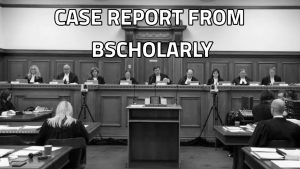Aoko V Fagbemi: This case established and brought into life the constitutional provision that no person shall be charged or convicted for an offence not defined with its penalty in any written law. Inasmuch as the act of adultery is an offence in the Northern region, it does not constitute an offence in the Southern states of Nigeria for the reason of it not being in any written law.
This case also brought into life a notable characteristic of law, that law has territorial limitations. Every law is enacted to apply to a particular territory or region, and to this effect, what constitutes an offence or a contravention of the law may not constitute so in another territory. This was the issue in this case.

Recommended: Mojekwu v Mojekwu, Facts, issues and decision of the court
Issues determined in Taiwo Aoko V Adeyeye Fagbemi and Anor, 1961 ANLR 400
a. Whether a person can be prosecuted and convicted for an offence not encapsulated and defined in any written law.
Also see: Differences between a tribunal and court

Facts of the Case of Aoko V Fagbemi
The applicant in this case pleaded guilty as charged at the Customary Court of Ijebu-Ijesha Grade ‘D’ for the commission of adultery. The case of the prosecution was that she committed adultery, having not obtained an order for judicial separation, and having not separated from his husband by agreement. The applicant was charged to Customary Court on the 24th of January, 1961. After she had pleaded guilty to the charge, the court for reasons known to him, went further and took evidence from the complainant who was the 1st respondent, and then from the applicant.
The court afterwards adjourned the matter severally for further investigation on the matter, after which judgment was giving, finding the defendant guilty. The Customary Court relied on the defendant’s judicial plea of guilt and the evidence of the witnesses to arrive at this decision. She was convicted and sentenced to a fine of €2 10s 0d or the option of one month imprisonment. Other costs and compensation were awarded by the Customary Court to be paid to the 1st respondent, the husband.
On appeal to the High Court, the applicant based his contention on the provision of section 21(10) of the then 1960 constitution of Nigeria which was to the effect that no person shall be convicted for an act not encapsulated as an offence in any written law and defined with a penalty under the any written law. The counsel contends that the charge of adultery against the defendant (now applicant) does not constitute an offence under any written law of the state.
The provision of the said section further made an exception to the effect that the rule no act shall constitute an offence except it is defined in a written law, does not apply to the offence of contempt of court, even though contempt of court is not provided for and defined with a penalty under any written law.

Recommended: Differences between data and information
Judgment of court Taiwo Aoko V Adeyeye Fagbemi and Anor, 1961 ANLR 400
The High court considered the contentions of the counsel to the parties and upheld that of the counsel to the applicant. Thus, the court held that the conviction of the applicant by the Customary Court violates the applicant’s fundamental human right as provided for in the constitution. The conviction of the applicant was consequently quashed and the decision of the court lower court overturned. The High Court further ordered that the compensation awarded upon conviction by the Customary Court against the applicant to be paid to the 1st respondent be refunded to her.
The court further observed that the procedure adopted for the institution of this action was right. The court in elaborating this point stated that, following the procedure for the order of certiorari would be a cumbersome and rigorous procedure which is unwarranted in a fundamental human rights matter.
The application was brought under section 31 of the Second Schedule of the constitution which prescribes that where one alleges that a constitutional provision has been violated, the person can bring application to the High Court of that region for redress.
Recommended: Best places to purchase lawyers wig and gown
The court further considered that the High Court has the original jurisdiction to hear such application pursuant to section 31(2) of the constitution for the purpose of enforcing any right which a person within that territory is entitled to. Subsection 3 of the same section reads to the effect that the parliament reserves the power to make laws with respect to the practice and procedures to be adopted in the enforcement of fundamental human right.
The court then noted that since no such law has been made to this effect, that the procedure adopted by the applicant is n order and stands a better recommendation for the speedy enforcement of citizen’s fundamental human rights. The court cleared the air by highlighting these principles since the application was not brought by order of certiorari but pursuant to section 31 of the constitution.

Edeh Samuel Chukwuemeka, ACMC, is a lawyer and a certified mediator/conciliator in Nigeria. He is also a developer with knowledge in various programming languages. Samuel is determined to leverage his skills in technology, SEO, and legal practice to revolutionize the legal profession worldwide by creating web and mobile applications that simplify legal research. Sam is also passionate about educating and providing valuable information to people.